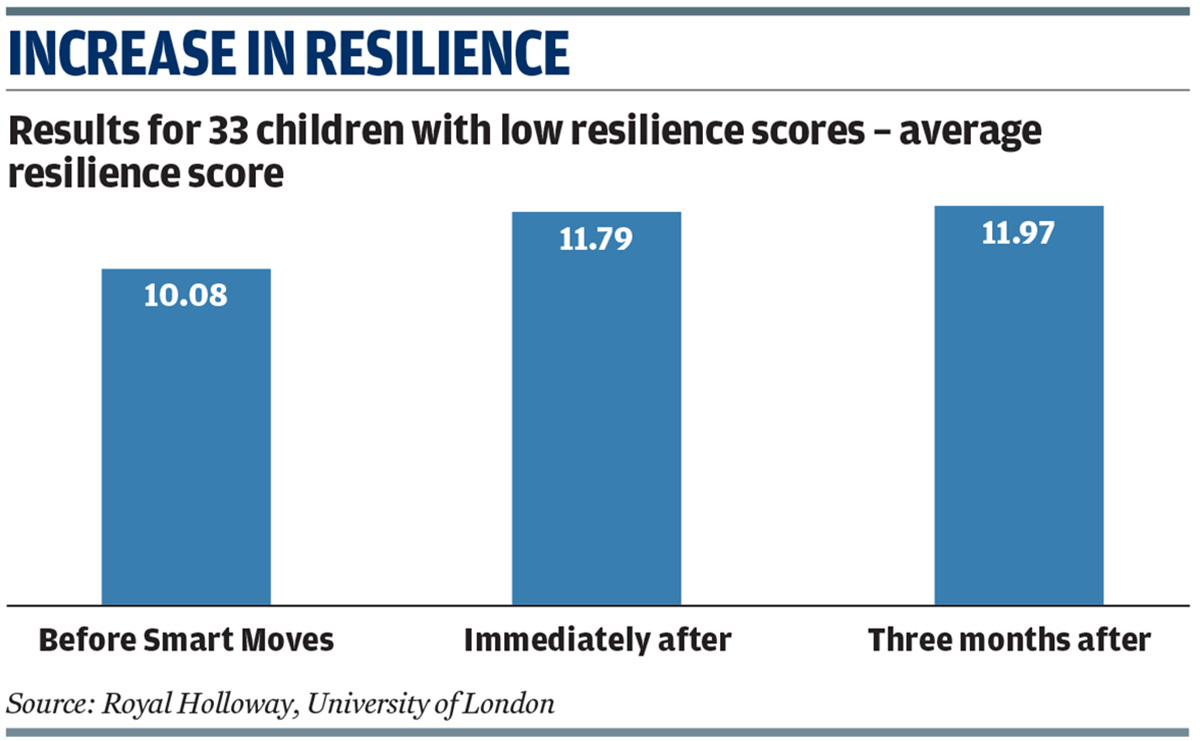Programme builds resilience of children in transition from primary to secondary school
Charlotte Goddard
Tuesday, February 26, 2019
Children and young people learn how to become more resilient with programme that eases the transition from primary to secondary school.

PROJECT
Smart Moves
PURPOSE
To help children and young people learn resilience
FUNDING
Smart Moves resources cost £51 for a class pack of 32 books and a teacher guide. In some areas schools can access funding to purchase the resource packs. In Surrey the pilot was initially funded by Surrey Heath Confederation then rolled out by Guildford and Waverley Clinical Commissioning Group's transformation fund
BACKGROUND
Smart Moves was developed by Surrey-based charity Eikon with the aim of boosting children's resilience and helping them with the transition from primary to secondary school. It is based on the Resilience Framework originally developed by Professor Angie Hart, director of resilience charity Boingboing, and psychiatrist Derek Blincow, with help from social worker Helen Thomas and a group of parents and practitioners. "The research shows us that resilience is a learnable skill and can be improved," says Joanna Brill, project lead for innovations and development at Eikon.

ACTION
The programme is designed for use in the last year of primary school and the first year of secondary school. It is delivered by a class teacher or form tutor and can be used across both year groups or just in years 6 or 7. There is also a year 8 follow-on programme.
Online training and a teacher's guide supports teachers in delivering the programme. Eikon also provides resources to allow teachers to train others to deliver Smart Moves.
In some areas partner organisations - such as the Hope Project in Staffordshire - provide face-to-face training.
Children are given books divided into modules covering different issues, with tasks and activities to complete. The programme can be worked through in any order, allowing teachers to focus on areas of need for their particular class.
Activities support the headings in the Resilience Framework - belonging, learning, solving problems and core self. For example, drawing or filling in a "support tree" can help pupils identify positive people and support in their lives.
One of the keys to success of the programme is that it encourages children to come up with their own ways to solve problems, explains Brill. "Smart Moves is not about telling young people what to do, it is about helping them discover for themselves," she says. "If they try a smart move and it doesn't work out, that's okay, they can try another one. The most popular session is the problem-solving flowchart which helps young people to independently solve their own problems. Schools can put it on the wall and encourage young people to look at it before they go to an adult."
The programme is built around four approaches: accepting, conserving, commitment and enlisting.
"Accepting" means accepting things that can't be changed - such as if a child's family refuses to get involved in school - and working with that student to find other ways forward.
"Conserving" takes the approach of focusing on the good things that are already happening in a student's life, helping them to use their strengths when facing difficulties and providing a range of tools for them to choose from.
"Commitment" is about building relationships between staff and students, as research shows that knowing a significant adult is looking out for them helps students form healthy attachment and builds resilience. Finally, "enlisting" aims to help students learn how to enlist help and support from others.
In Surrey, 74 per cent of schools deliver the programme. Middlesbrough's Big Lottery-funded HeadStart programme has rolled out Smart Moves across its schools, and Sussex and Staffordshire schools are also using the programme. The scheme works best as a whole-class programme, says Brill. "Many emotional literacy support assistants and other pastoral workers love the resources and want to use them for small groups - however we found that it works best as a whole-class intervention," she concludes.
OUTCOME
An evaluation by Royal Holloway, University of London surveyed 150 children about their resilience before, immediately after and three months after taking part in the intervention. The evaluators found 33 children who had low resilience scores before the intervention saw those scores increase from an average of 10.08 before taking part in Smart Moves to 11.79 immediately afterwards.
Resilience levels had increased three months later to an average of 11.97. Pupils initially low in resiliency reported positive changes in physical health, mood, friendships and family life following Smart Moves.
- If you think your project is worthy of inclusion, email supporting data to derren.hayes@markallengroup.com




